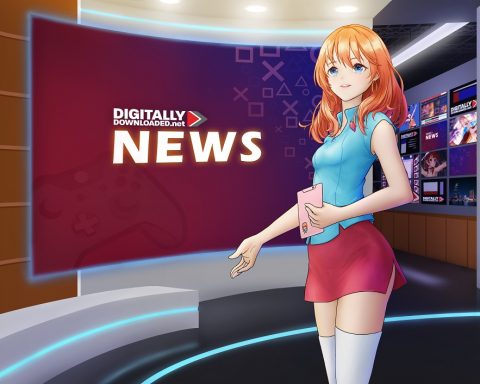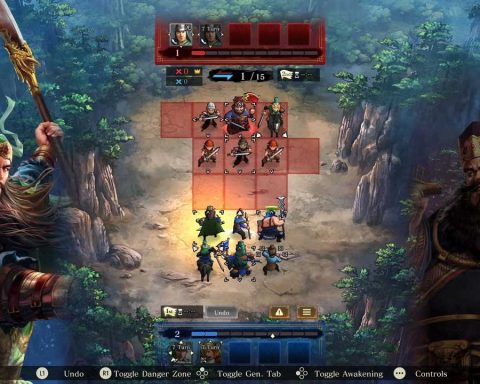Sony’s announcement of a new PlayStation 3 model was the ‘shiny light’ of its Tokyo Game Show performance this year, but the real announcement worth keeping an eye on was the confirmation of its PlayStation Plus plans. Specifically, the confirmation that the full PlayStation Plus program – free games and all – would be coming to the PlayStation Vita in November.
This is significant news, for two reasons – firstly, it’s going to be a big boost to the Vita’s market potential. The fact that you’re able to buy a Vita and then become a PlayStation Plus subscriber and never need to buy a game again is going to be a significant advantage over both the Nintendo 3DS (which doesn’t have a similar subscription opportunity) and the iPhone and iPad (the Vita’s free games will be very high-quality compared to the free games on Apple’s devices).
Sony’s target audience for its PlayStation Vita was always the PlayStation gamers first, and growing the market a distant second. That’s why Sony has always touted the cross play compatibility and the ability for the PS3 to “talk” to the Vita for other gaming applications.
PlayStation Plus falls into the same category. People who are already PlayStation Plus members will now be far more incentivise to buy a Vita, because now they’re going to get free games out of their existing subscription investment.
And naturally, as the console becomes more popular, third parties will invest more in it, and that will encourage new customers to take a look at the console. I see PlayStation Plus singlehandedly boosting the Vita’s fortunes in the market.
But beyond that immediate effect I think this announcement is significant because it demonstrates a clear direction that Sony is heading in, and it’s something that is going to benefit everyone.
The simple reality of the games industry is that games are worth less and less. That’s not to say they’re becoming cheaper, but thanks to the proliferation of competition (including new platforms such as the App stores and the likely growth of Steam into hardware), games are becoming more of a commodity sell. Publishers are now discounting earlier and more active in looking for ways to repackage games. In other words, the games themselves are worth less to the publishers.
One of the most effective ways to take this low-value content and use it in a way that builds customer loyalty is to give it away. The most effective way to do that is to give it away in such a way that if the customer stops being loyal, they lose that content. In other words, PlayStation Plus. Gamers pay $Aus60 or so a year for access to a library of 20+ games per year. If they decide not to resubscribe, they lose that library of games.
Just like Apple threatens customers with the loss of their music and movie collections if they ever stop using iDevices and iTunes, Sony is looking to do the same with games. When you’re talking about both your handheld and mobile gaming devices, the impact becomes all the more pronounced. In other words, by being reasonably generous with content, Sony is developing a fan base that is ‘locked in’ to Sony platforms.
Come next generation, we’re going to see that impact really hit home. PlayStation 3 and Vita gamers with PlayStation Plus subscriptions will have a really compelling reason to buy into the new hardware. It won’t be a case of a new console “starting from scratch,” it will rather be an upgrade to an existing product. We’ve seen this at play already – look at the people who keep upgrading their iPhones and iPads.
Sony’s acquisition of Gaikai shows that Sony understands that it is content that is the critical battleground for the ‘console wars,’ going forward. While Nintendo focuses on hardware innovation and wrapping game experiences around that hardware, and Microsoft invests big on turning the Xbox into the living room general entertainment hub, Sony is taking Apple’s approach of building a deep stable of content and then tying a multiple of devices to that content.
It’s something the third party publishers will get on board with, too, as it helps to give their content a longevity and presence above and beyond existing sales avenues. And so, I see the evolution of PlayStation Plus and its imminent launch on the PlayStation Vita a very exciting taste of things to come.








I think this is great news. I've been a big proponent of the PlayStation Plus though since I first tried it for free back when Sony did their 'welcome back' program after their online service was downed for awhile.
is this a joke?
the vita is basically dead and its going to kill 3ds and ios which are selling ganbusters?
I'm actually letting my PS+ expire. Not because it isn't a great service — it is — but because I don't have the time for it any more.
My backlog of games has multiplied by a massive amount thanks to Plus (yet to play Borderlands, barely touched Red Dead, and those freebies they gave us at E3…. sigh).
I'm sticking with Plus because I reckon that by the time the PS4 rolls around virtually everything will be subscription-based. I'm not sure Sony will be selling its games "to own" at all for much longer. I reckon it's going to be like Music Unlimited.
This is a very interesting opinion piece, thanks Matt.
The problem with Playstation Plus as I see it is that if I am a developer and indeed my metrics show that people are buying Vita to enjoy the Plus service, this lowers my incentive to invest resources into developing quality premium content for the platform. If my potential customers and their valuable time is directed toward this hi-quality service and its steady flow of "free" content I would be concerned that my new games would not garner the attention they deserve.
From a consumer point of view I think its terriffic…but I wonder if developers may come to lament this additional potential attention thief!
The higher order concern however, as your article touched on, is the notion of value that a game holds. I am most curious to see if even the high level "core" gaming consumer is steadily being conditioned through cheap used games, cheap mobile games and cheap services along with freemium contents (all quality I might add!) to eventually rebel against high-cost, high-priced content. The crazy fear there is, of course, that such a market reaction would crush the business incentive to create those experiences.
Lastly of course, and most relevant with the Vita, there is the basic and elemental argument that perhaps a Viable market for a Vita-class device No longer exists, as distressinlgy low sales seem to suggest. But perhaps the presiding argument that lack of content is the reason will indeed be tested by this enticing Plus Service!
This is a great response, thanks for taking the time to say it!
I'd just like to offer a couple of counter-arguments, for the sake of discussion 🙂
1) I would suggest that developers are learning how to work with Sony with regards to PSPlus. There is no way that third parties would be involved without some kind of kickback. Rockstar recently "gave away" Red Dead Redemption for instance. Now, given the age of the game, anyone still buying it at retail was probably buying it second hand (and so benefiting Rockstar none), or at a heavy discount for a new copy. There was essentially no value left in the original game. However, by giving it away perhaps Rockstar found some new fans, and perhaps they bought the DLC, or even another Rockstar game? There's the kickback. Borderlands was another Plus "gift"… right before Borderlands 2 was released. What a great way to drum up some market interest! So there are ways that publishers can and do work with PSPlus to their benefit. It's not a charity to the fans by any means, even though the fans aren't paying for that specific game any more.
2) I would argue that the consumer's interest in premium content has already disappeared entirely. Lollipop Chainsaw was discounted one day after it was released. Virtually every game is discounted within a week, and by the second week second hand sales take over. The whole reason that DLC has become so important to publishers is that they can no longer rely on the actual game sales for profitability. Sad, but true, and perhaps we'll see some great innovations to come from the new push towards fremium and minimal-priced content with paid-for extras. Certainly if I get really hooked in a game I don't mind paying $200 over its lifetime for a whole lot of extras via DLC, and this is far better for the publisher than a "sell for $50 then forget" business model.
3) It's entirely possible that the Vita will never hit a mass market penetration. Quite likely it won't unfortunately. It's what happens when the iPad and iPhone steal 99% of the casual gamers, and Nintendo maintains a stranglehold over the scraps that are left.
PSPlus could make it a worthwhile purchase for PS3 owners, however, and it could find a secondary market there, even if people never "buy" a game for it. Where I see Vita's biggest potential is as a complement for the PS4 and Sony's Cloud gaming. It'll be a niche but lucrative product for Sony then.
Great follow up points, Matt! Your comments regarding 1) in particular had me nodding my head…leveraging the "long tail" and simultaneously building up brand awareness for specific titles are indeed very valuable benefits for a publisher.
Still leaves me to wonder, on the operations side of Sony, given the volume of content provided each year at $50 annual, and the discounts on top of the freebies, is this a loss leading program designed to create a "halo effect" for their other products? Plus must be a very expensive service with increasing infrastructure costs and content licensing (not to mention some small lost opportunity cost since feeebies mean no royalty collected)!
Your thoughts on their potential strategy in combo with future platforms is intriguing. I can see from their recent announcements their positioning to sell this thing to PS3 owners but am worried the content will not be there for this platform…PS3 has a healthy library to draw on. The Vita, while I know it is young in its life cycle, has not been showing a lot of quality software development beyond a very juicy (if largely console companion) handful of titles. Which may perhaps leave Gaikai as its saving grace, hahah.
Rich legacy content in a full blown subscription model would be fascinating…though for expensive new hardware, unique and compelling New game experiences are still what customers are paying for!
Well, its not dead yet…You and I may disagree that the market for this kind of device is already non-existant, but realistically Sony does have some bullets left to fire that can cause some market ripples. A monster hunter title alone would shore up its fortunes in the handheld-crazy Japanese market and of course, while not a silver bullet, a price cut would do wonders for it worldwide.
The customers Sony wants to serve with this probably exist in adequate numbers but the value-for-cost equation the Vita is proposing them right now is out of whack…and, as oft repeated, killer killer games (I dont know where they are gonna come from tho) can always leave a mark!
its 100 percent dead.
My take on PSPlus is that it is more of a marketing activity than an attempt to generate profitable revenue. By encouraging people to use the PSN on a regular basis, the idea (I assume) is that a highly engaged userbase is more likely to buy PSN content.
Of course, it may well be profitable too. Services like Spotify and Music Unlimited are apparently profitable with music, so why can't the same work for games? Centralising content and delivering it as Cloud subscription does have a significant advantage – it turns the randomness of game sales (you never know exactly how many games you're going to sell) into a stable annuity model (you're going to get X dollars from each person from year). More than anything else companies like reliable revenue.
As for Plus on the Vita, I would assume that to start with the "free" games will be drawn largely from the PSP and PSOne catalogue, as the Vita's own content library builds. At least, I hope so – I have almost all the Vita games lol.
Thanks again for the comments. I am very glad that you found us – I'm always up for a good, in-depth debate with people who enjoy the business side of the industry 😀 Hopefully we can encourage you to stick around!
I wouldn't worry too much about debating with Vampiric. He never offers up any kind of supporting evidence for his claims. With him it's basically a case of "I'm right because I said so."
And of course we're meant to take him seriously, despite the fact that he's yet to string together a sentence that uses correct grammar.
In other words he's the standard troll that every website eventually attracts. 🙂
Hey man, was just browsing through the internet looking for some information and came across your blog.
I am impressed by the information that you have on this blog. how to get him to propose